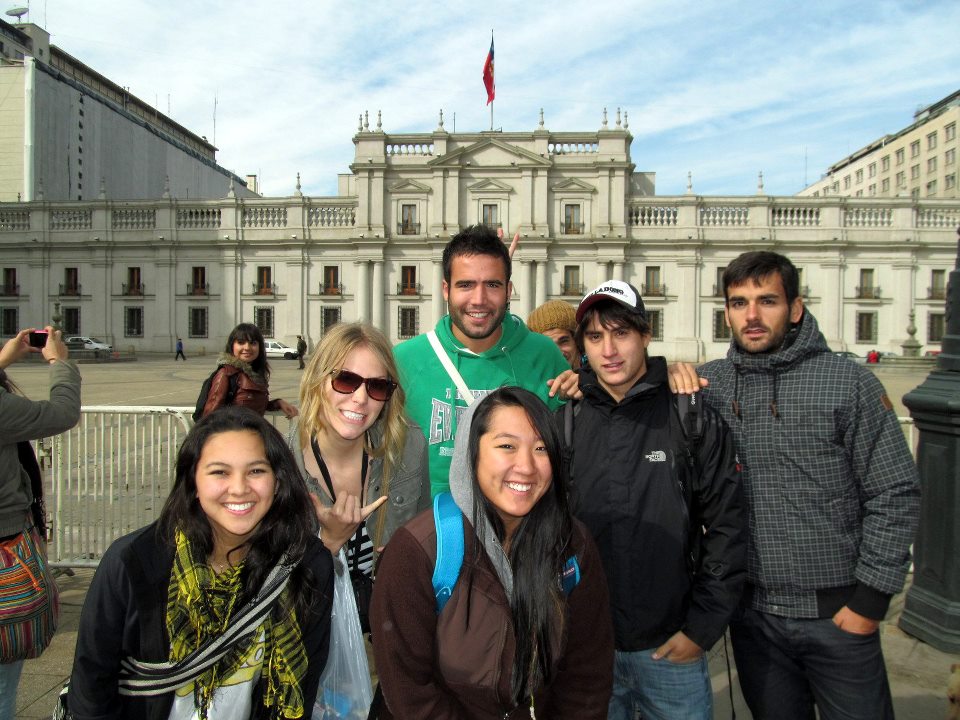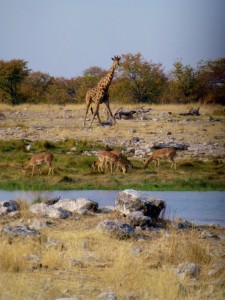This may or may not be one of the longer posts I’m going to have on this blog, but if it helps, there are a lot of pictures too 
Here we go!
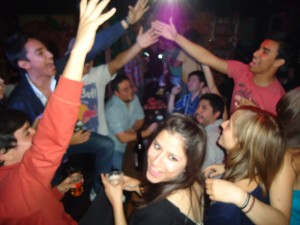
Singing/Chanting about Chile at Ston
It all started last Wednesday night, a big night to go out here in Chile. A big group of us went to a bar called Ston and started celebrating los días de patria (patriotic days) early. We enjoyed a drink called terremoto(earthquake) and is a mix of wines, grenadine, and ice cream. It’s delicious, and there are tons of different flavors!

Students in traditional Chilean gear
The next day, Thursday, we had a celebration with the other international students at the UVM Rodelillo campus. There was plenty of food and dancing, specifically the cueca, Chile’s national traditional dance. They even had a contest for those international students who attended cueca classes (which I unfortunately couldn’t attend due to soccer training). It was very fun to watch! Especially with all the missteps  but they all did very well. Then they had a game after that anyone could participate in where you had to (without any hands) eat a sweet in a shallow plate of water, find another in a pile of flour, and finally bite an apple. I got 2nd…of 3. Silver medal!
but they all did very well. Then they had a game after that anyone could participate in where you had to (without any hands) eat a sweet in a shallow plate of water, find another in a pile of flour, and finally bite an apple. I got 2nd…of 3. Silver medal!
On Friday, my friend Olivia and I decided that we should study…but we made brownie sundaes instead. Little did we know, that as we were making the ever delicious dessert for la once Basilio, a friend of Olivia’s family, was making panqueques con manjar! It was a very sweetonce to say the least.
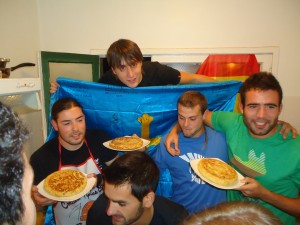
Spaniards with their tortilla española
Later that night, we went over to an apartment where the Spaniards had a dinner with tortilla española (an omelete with onions and potatoes) and bread with Spanish ham & tomato (I don’t know if that one had a particular name). We ended up going to Sala Murano and getting our groove on for the rest of the night. Because I had a friend who worked there, we all got in for free, which made the night even better (because who doesn’t like saving money). We made it even more patriotic with our friend Mauricio who painted some of our faces with the Chilean flag.
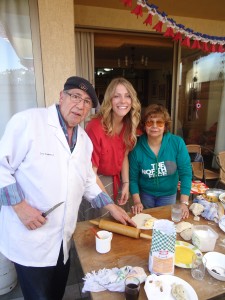
Olivia with her host mom & Basilio making empanadas
Saturday, Olivia’s family invited me to a BBQ where we madeempanadas de pino from scratch with Basilio again. Later that night we went with Olivia’s host brother to watch fireworks at the beach where I heard the Chilean national anthem for the first time. They continued to play traditional patriotic songs as everyone around us hummed or sang along as fireworks continued to shoot up over the water. After the beautiful display, we went to the fonda (a fair/get together) at Sporting, the horse race track. On the walk over, I even met some people from Minnesota! I told them what part I was from and we actually had some friends in common. It’s crazy how small of a world this really is. When we arrived, the place was filled with rows upon rows of vendors selling food and drink. They had even set up places to sit or dance!
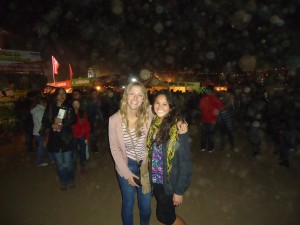
At the fonda at Sporting
There were soooo many people, so we decided to sit down at a small set-up bar and enjoy a jar of terremoto. When we were about to leave, we lost Olivia’s host brother and his friends and neither of us had anymore credits on our phone to call him…so we decided to just go home. Olivia walked me to where the collectivos were and I experienced one for the first time. I learned a valuable lesson:collectivos and taxis are not the same thing. But I had a great conversation with the driver, and he helped me get to where I needed to be.
Sunday I spent with my host family at home, where they had a giant asado (BBQ) with all of the family. I finally met Claudio’s son (Francisco) and daughter (Carolina), and Vivi’s sisters were there too (Jaqui & Carolina). Caro (Claudio’s daughter) also brought her adorable puppy who was all ready for Independence day and dressed in traditional Chilean gear. We had tons of meat, salad, cola de mono(monkey tail; milk, coffee, and a Chilean liquor), pisco (Chilean liquor),and chica (a slightly carbonated alcoholic juice).

Big family lunch!
I learned plenty more Chilean slang words from Francisco (who may be the most Chilean guy I’ve met so far). We sat for hours exchanging stories, teaching/learning more about Chile, and consuming more food and drink than thought to be humanly possible. It was one course after another after another after another of the lunch, then the coffee & the palete cleanser (mote con huesillo), and then more coffee and Chilean desserts. All together it had to be at least 6 hours, if not more, and I loved every minute of it.
Monday, I left Viña and traveled to La Calera where my other family lives, and we left for Palos Quemados to camp which was only about 30 minutes away. It was absolutely stunning. We were set in between the hills. Everywhere you went you could smell asados and cooked meat. Our crew had plenty of meat and the traditional Chilean salad: onions, tomatoes, and cilantro. We relaxed and danced a bit with our radio and I learned more about Universidad Católica (a soccer team of which I am now a fan). I can now recite a few of their chants  Then I cuddled up in our tent
Then I cuddled up in our tent
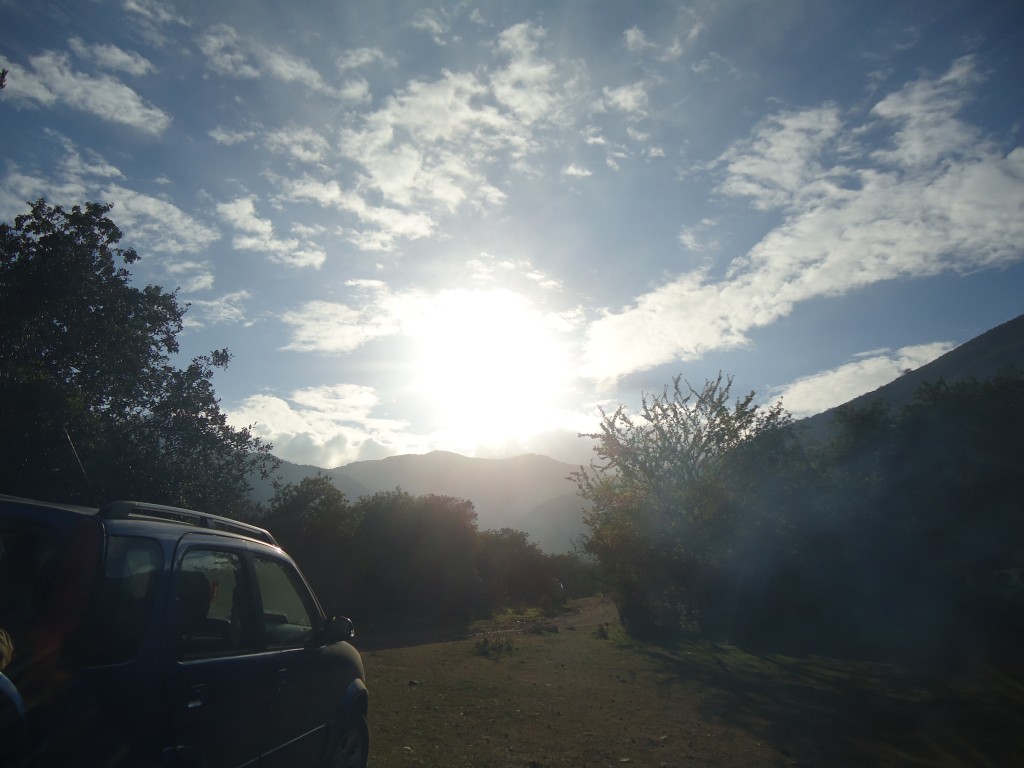
Palos Quemados
The next morning, aTuesday, and the official Independence day of Chile. I woke up to the beautiful landscape and clear skies. We had a little bit of bread toasted over the fire for breakfast and some tea. Then interspersed naps with lunch and more naps; successful laziness. It wasn’t until I saw some people playing soccer in the campsites next door that I gained a sudden spurt of energy. We asked if we could play and got a game going. It was cloudy at this point and little mists of rain cooled us off as we continued to get muddier from the futbolito (little soccer game). Then we had to start packing everything up and get going, and of course at this point it was clear and perfect outside…figures. We got back to La Calera and gathered with the cousins to go to Oscar’s apartment to watch the Universidad Católica game against Tolima (Columbia) in the Southamerican cup. They didn’t do so well in that game, but they still did well enough to move on to the octo-finals! YAY! We then went to a fonda which consisted of a ton of people, really expensive drinks, and a live band. They didn’t even have terremoto…but at least we got to dance.
Wednesday rolled around and I left La Calera and enjoyed a quiet lunch with my host family where, for the first time, everyone was present! We had empanadas, salad with onion, pepper and eggplant, and for dessert, banana with honey. Then I enjoyed a relaxed night with some friends playing UNO at their apartment.
And now it’s Thursday where I’m about to go to the beach with my Columbian friend, Andrea, and enjoy the sunset on the beach.
I’ll update you soon!
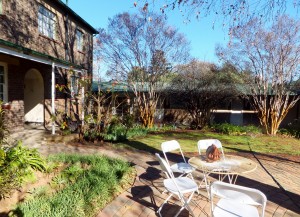 We piled into the vans and headed to St. Peters Place—our home for the next week, an old brick building with dorm style rooms, a center court yard, library, and dining area. It was really cute, but had no heat. That night, we settled in wearing several pairs of socks, huddled together under blankets and clinging to cups of hot tea. Not at all what I expected , but an extremely intense game of “mafia” helped keep our minds off the cold and I was happy to find that our group felt very natural and we seemed to “click” immediately.
We piled into the vans and headed to St. Peters Place—our home for the next week, an old brick building with dorm style rooms, a center court yard, library, and dining area. It was really cute, but had no heat. That night, we settled in wearing several pairs of socks, huddled together under blankets and clinging to cups of hot tea. Not at all what I expected , but an extremely intense game of “mafia” helped keep our minds off the cold and I was happy to find that our group felt very natural and we seemed to “click” immediately.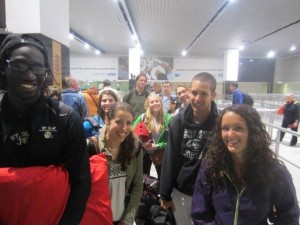
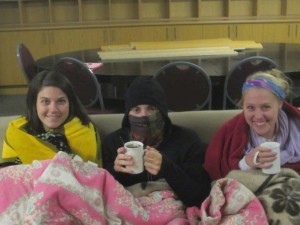
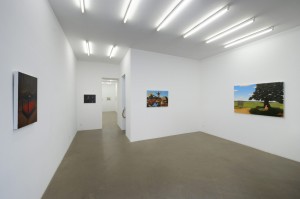

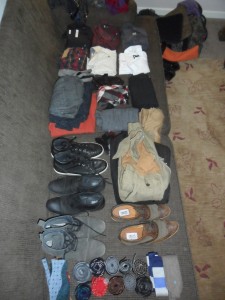
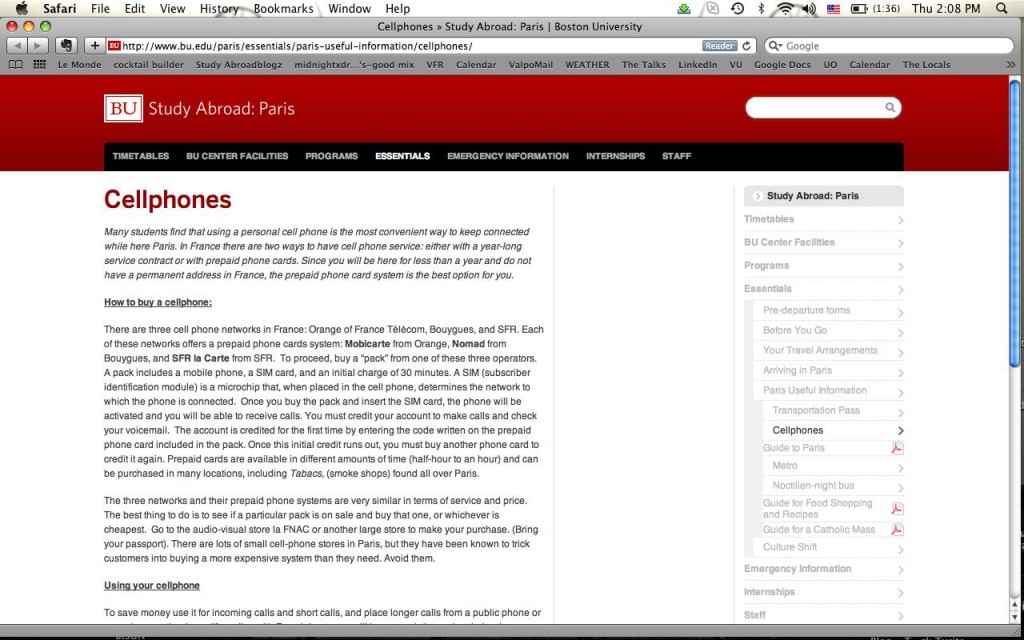
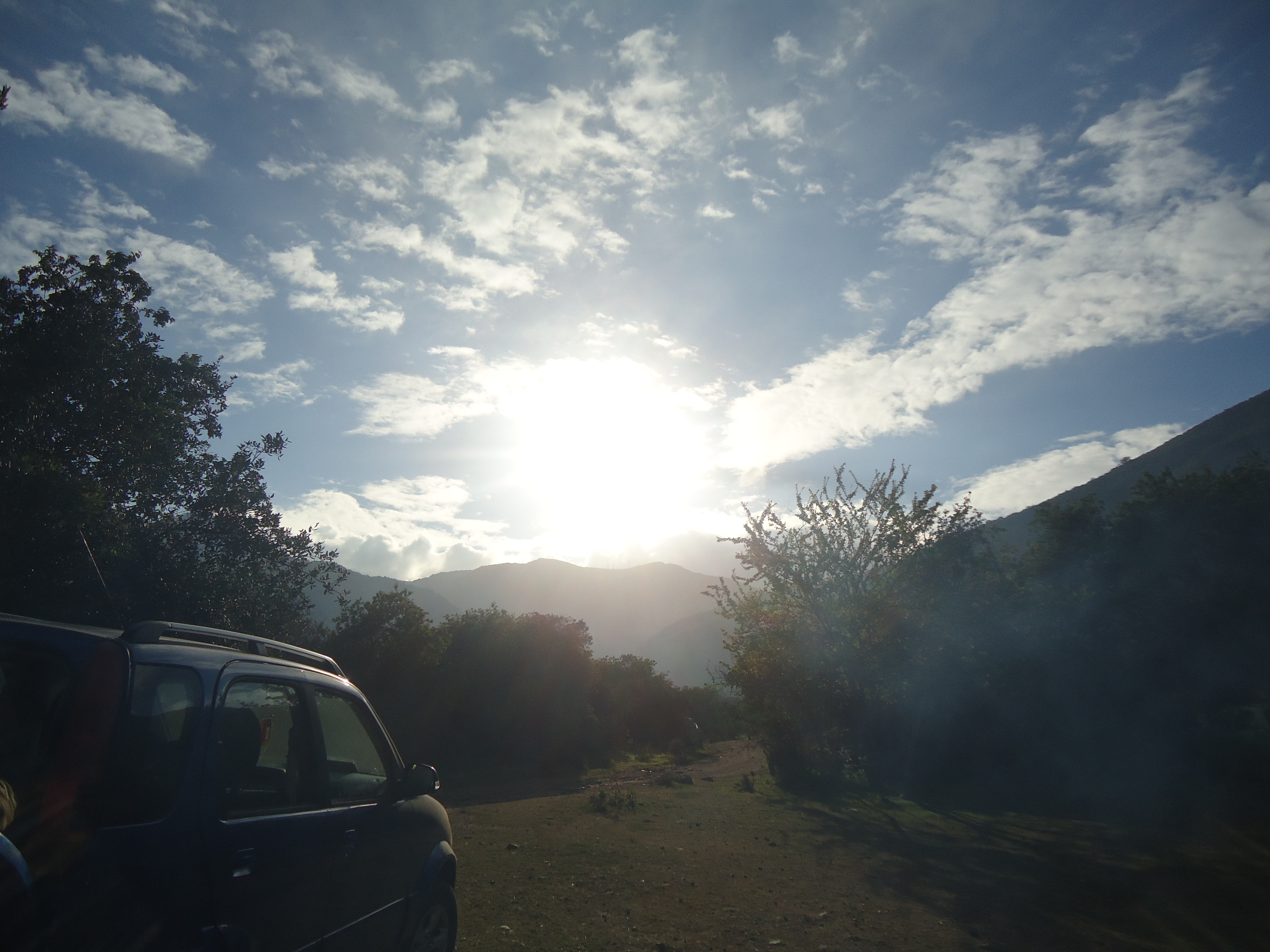











 Feelings of homesickness may even start before you leave to study abroad in the country of your choice. You may find yourself mildly depressed or anxious several weeks before leaving. The anticipation and preparation for this major change of lifestyle can trigger pre–departure homesickness, or sudden feelings that you don’t want to leave, or even a want to back out of your decision to study abroad.
Feelings of homesickness may even start before you leave to study abroad in the country of your choice. You may find yourself mildly depressed or anxious several weeks before leaving. The anticipation and preparation for this major change of lifestyle can trigger pre–departure homesickness, or sudden feelings that you don’t want to leave, or even a want to back out of your decision to study abroad.
